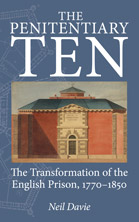 |

|
The Penitentiary Ten NO LONGER AVAILABLE If you would like to recommend this title to your library please download a library recommendation form here The Penitentiary Ten takes a fresh look at a key moment in British criminal justice history: the eighty-year period after 1770 which saw the emergence of a new conception of the Prison as a privileged site of punishment and reform. The book examines the contribution of ten men and women - the "Penitentiary Ten" of the title - to the wide-ranging debates of these years. Beginning with a reassessment of the thought and action of pioneering amateur prison inspector, John Howard, the book then turns to consider how the remaining Nine attempted to see their revolutionary ideas concerning carceral architecture and management realised on the ground in bricks and mortar. The Penitentiary Ten has then a double focus. In part it is an exercise in individual or collective biography, in part a study of the history of such prisons as Pentonville, Newgate and Millbank - not to mention Jeremy Bentham's ill-fated national penitentiary, the Panopticon. Each chapter examines how different individual trajectories crossed those of particular prisons; with what consequences for both, as well as for the broader history of penal policy in England. Some of the Penitentiary Ten were professionals with a career in prison design and/or management; others came to the field by accident. Some like Howard, Bentham or Elizabeth Fry were well-known to contemporaries; others, like George Holford or George L. Chesterton, were not. Some have been the subject of prolonged and detailed interest on the part of historians; some have largely escaped critical notice. All, argues Neil Davie, made a major contribution to both the theory and practice of prison reform in England in the period 1770-1850. Emphasising the complexity and variety of the forces at work in penal policy during this period, and the halting, often contradictory, trends and impulses which resulted, The Penitentiary Ten offers a lively, accessible account of prison reform in this crucial period, and is sure to interest both students and teachers of British criminal justice history as well as the interested general reader. "The Penitentiary Ten is a fascinating work which skilfully interweaves the biographies of some of the most influential actors in the evolution of imprisonment at an important moment in its history. This study explores the development of prison in both philosophical and architectural form using case studies to unravel the competing narratives underpinning prison reform from the late 18th to the mid 19th century. Importantly, this thesis illuminates those who put theory into practice, those who envisioned the new 'penitentiary' and those who saw it, or failed to see it, come to fruition." "Since the days of Michel Foucault prison reformers have been a kind of suspects. Neil Davie looks at them and the institutions they sponsored with a fresh eye, arriving at a balanced assessment that transcends the dichotomy of praise or blame." "[An] excellent depiction of the evolution of penal thought and action in the century or so that followed the debates of the 1770s. [...] The issues examined in this book [...] remain timely, perhaps timeless. Commanding and certainly worthy of our attention, they should lead us to humility even while they stimulate and only partly satisfy our curiosity. As we contemplate the lives and times that Neil Davie spreads before us, we find examples of many of the puzzles that continue to engage and baffle. Heroism and self-abnegation take their place alongside egoism and intolerant, stubborn dogmatism; compassion alongside studied callousness; hope alongside disengagement; humane morality alongside a sterile political economy." About the Author: Neil Davie is Professor of British History at Université Lumière Lyon 2, France. After studying sociology, anthropology and social history at the universities of Durham and Oxford, he moved to France where he has been living and teaching since 1988. He has published widely in the field Contents: Acknowledgements Conclusion |
Email: info@bardwell-press.co.uk Tel.: 01865 865 865 Fax: 01865 595 598